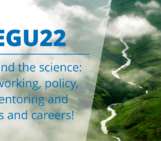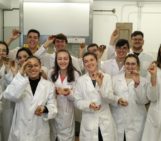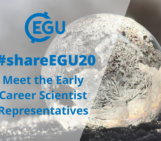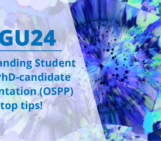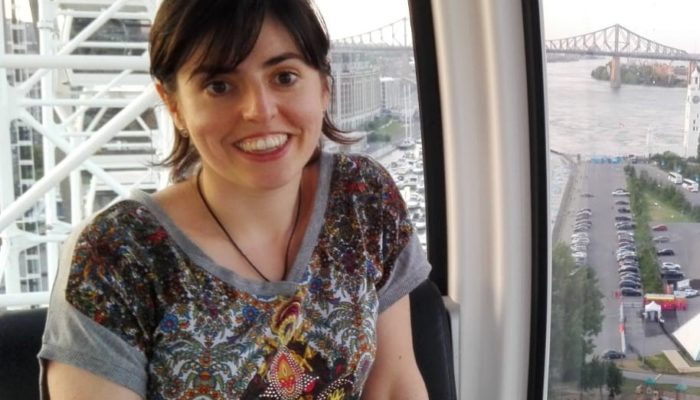
My name is Saioa Arquero Campuzano. I’m a postdoctoral researcher at the Geosciences Institute in Madrid and I’m the Early Career Scientist (ECS) Representative for the Earth Magnetism and Rock Physics Division at EGU. This is my fourth year as a postdoc. After my PhD in Physics at Complutense University of Madrid, I moved to Rome (Italy) for doing my first postdoc at the Institute of Geophysics and Vulcanology, and after three years I came back to Spain with my current 2-year postdoc contract. This with regards to my still unstable professional situation, as sadly is the case for many ECS. Regarding my research, I study the Earth’s magnetic field variations in different space and time scales using from paleo- to satellite magnetic data, and the possible links between different geophysical and climate variables using information-theory tools and other sophisticated techniques. At this moment, I am especially interested in the study of some intriguing features of the Earth’s magnetic field such as the South Atlantic Anomaly and the geomagnetic jerks.
For me, it represents RESPONSIBILITY. In my view, this role involves the need to connect with the ECS of your Division to know which are their concerns, what they need from the EGU, what they can get out of EGU and how to work toward a more inclusive General Assembly. In the case of our Division, we are very interconnected with many other Divisions (Tectonic Studies; Geodynamics; Nonlinear Processes; Natural Hazards; Geochemistry, Mineralogy, Petrology and Volcanology; etc) and so sometimes it is difficult to connect with people that identify with Earth Magnetism and Rock Physics as their Division. My personal goal is to facilitate the creation of a strong ECS Team within our Division by promoting different events (short courses, networking) and useful platforms to make easier our communication. In practice, my role as EMRP ECS Rep includes managing the Social Media (Twitter and Facebook), and recently we began to use a Slack channel to involve the ECS more, which is working very well!!
Well, this is an interesting question because as I already mentioned our Division covers several research topics interconnected. In few words: anything related to the Earth’s Magnetic Field and Rock Physics: from Solar-terrestrial interactions that involve the external geomagnetic field to the physical processes responsible for Earth’s interior magnetic field spatial and temporal variability for the former. Experimental and theoretical rock deformation to understand physical properties of rocks and minerals and their evolution in different contexts such as energy and geo-hazards for the latter. Our Division addresses theoretical and experimental aspects of rock physics, rock mechanics and deformation, geo-hazard mechanics, geo-resources search, transport properties, environmental magnetism, magnetic anomalies, plate tectonic reconstructions, magnetic polarity reversals, mechanical and magnetic properties, electrical conductivity of the Earth’s crust and mantle. All key topics to understand better our ‘living planet’.
Your own research considers the Earth’s magnetic field – you’ve investigated the tectonic strain that precedes Earthquakes, the magnetic anomaly in the South Atlantic, and explored the link between the Earth’s ancient climate and variations in the magnetic field. What key message would you like people to know from your own research?
From your summary I think that it’s clear that my experience is very diverse! I think that this opportunity that I have had to explore different topics during these years has been very important for me, especially to have a global perspective of this highly interdisciplinary research area. I hope that this could help to create an ECS group that represents our very interdisciplinary Division.
How can our readers become involved with the Earth Magnetism and Rock Physics Division?
There are three main ways you can get involved:
1) Send me an email to ecs-emrp@egu.eu with your email address to participate in the ECS team or ask to be added to the the Slack channel and learn the last updates of our Division!! It is completely friendly, in the sense that you decide how much you want to engage in the channel: just reading or being more active, it’s fine! The important thing is that you are interested in the ECS activities linked to EMRP.
2) Follow us on Twitter (@EGU_EMRP) and Facebook.
3) Subscribe to our mailing list here. We send around 6-8 emails per year and it is especially useful before and during the General Assembly because we provide information about the main events associated with our Division, ECS, networking, etc.
I would like to create an ECS Team with more than two members – which is all we are now! I think that the Slack channel can be very useful for this because people are constantly updated on what we do in our Division, our work with EGU and the rest of the Divisions, and it can facilitate the ECS networking as well. I hope that for the next General Assembly I can announce that our team has grown with new members!!

